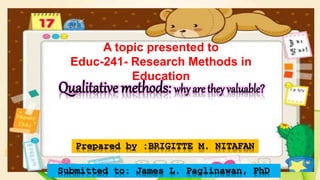
Qualitative Research
- 1. A topic presented to Educ-241- Research Methods in Education Qualitative methods: why are they valuable? Prepared by :BRIGITTE M. NITAFAN Submitted to: James L. Paglinawan, PhD
- 2. STEPS IN QUALITATIVE RESEARCH Identification of the phenomenon to be studied Identification of the participants in the study Generation of Hypotheses Data Collection Data Analysis Drawing Conclusion
- 3. discussion lead by a moderator in which a small group of subjects (5-12) talk in depth about a defined list of topics of interest. Homogenous in nature. Capitalized on group dynamics and allow a small group of participants to be guided by a skilled moderator into increasing level. TWO LEADING QUALITATIVE METHODS are extended discussion between a subject and interviewer characterized by extensive probing and open-ended questions. conducted on a one-on-one basis between the subject and highly skilled interviewer. Individual Depth Interview (In-Depth Interview) Focus Group Discussion
- 4. When to Use Individual Depth Interviews Complex subject matter and knowledgeable respondent Highly sensitive matter Geographically disperse respondent Peer pressure A study among physicians on their attitude and practices regarding the treatment of a certain disease using newly discovered medicine. A study among women who have had a tubal ligation regarding their feelings about sexuality. A study among population policy makers in eight countries regarding their reaction to a document on child spacing and mental health. A study among consumers obtain their reactions to a potentially controversial advertisement where a “social desirability” response might cloud the real persuasive power of the message.
- 5. Good at eliciting the beliefs and opinions of a group Interaction of respondents will generally stimulate richer responses and allow new and valuable thoughts to emerge. Easy and inexpensive to organize and can be completed more quickly than a series of depth interviews. The researcher can observe the discussion and gain firsthand insight into the participants’ behaviors, attitude, language and feelings. Reason to Use FOCUS GROUPs
- 6. ANAYSIS OF FOCUS GROUP DISCUSSION DATA Refine your focus Reassess central questions Review Transcript Record insight and summarize you reflection after each focus group Review similar studies Play with metaphor, analogies, and concepts DURING DATA COLLECTION
- 7. Order focus group transcript and other information chronologically. Number each line of the transcript so you will know where specific responses came from. Review all your data at least twice. Conduct initial coding by generating numerous code. Label data that are related. Write notes to yourself. Watch for special vocabulary. ANAYSIS OF FOCUS GROUP DISCUSSION DATA AFTER DATA COLLECTION
- 8. Setting context provide background information on the setting, topic, or subjects. Defining the Situation codes categorizes the world view of respondents and how they see themselves in relation to a setting or your topic. Respondents Perspective codes capture how respondents define a particular aspect of a setting. Respondents’ Ways of Thinking about people and objects capture how they categorize view each other, outsiders and objects. Process categorize sequences of events and changes over time. COMMON TYPES OF CODING CATEGORIES
- 9. Activity identifying reoccurring informal and formal types of behavior. Event codes infrequent or unique happening in the setting or lives of respondent. Strategy ways of people accomplish things. Relationship and social Structure tells about alliances, friendship, and adversities as well as about more formally defined relations. Methods research approaches, procedures, dilemmas, and breakthroughs. Bogdan and Biklen (1998)
- 10. When conducting a content analysis. The coders must be trained. Having two people read and code the same set of documents. Triangulate draw from several data sources, methods, investigations, or theories to check out the consistency of different data sources. CONTROLLING FOR BIAS
- 11. Focus is on: What is important in the data? Why is it important? What can be learned from it? DATA INTERPRETATION Characterized as the reflective, integrative and explanatory part of dealing the data.
- 12. Consider type of the study used. Pay attention to your research focus. Look at categories that contain large amounts of data as they are likely to contain links or sequences. Focus on the pattern. Examine existing studies related to your topic to help identifying interpretations. Talk with peers about the data and discuss interpretations. Step back from the data every now and then. DATA INTERPRETATION
- 13. Prado, N. I., Penaso, A. M., Cimene, F. T., Aves, L. S., & Simbulan, S. G. (2011). Research Methods. Maramag. Reference: